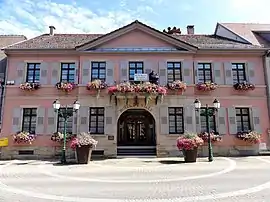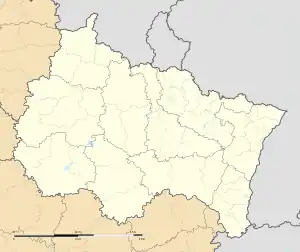Soultz-sous-Forêts
Soultz-sous-Forêts (French pronunciation: [sults su fɔʁɛ]; German: Sulz unterm Wald) is a commune in the Bas-Rhin department in Grand Est in north-eastern France.[3]
Soultz-sous-Forêts | |
|---|---|
 The town hall in Soultz-sous-Forêts | |
 Coat of arms | |
Location of Soultz-sous-Forêts | |
 Soultz-sous-Forêts  Soultz-sous-Forêts | |
| Coordinates: 48°56′22″N 7°52′53″E | |
| Country | France |
| Region | Grand Est |
| Department | Bas-Rhin |
| Arrondissement | Haguenau-Wissembourg |
| Canton | Wissembourg |
| Government | |
| • Mayor (2020–2026) | Christophe Schimpf[1] |
| Area 1 | 15.15 km2 (5.85 sq mi) |
| Population | 3,169 |
| • Density | 210/km2 (540/sq mi) |
| Time zone | UTC+01:00 (CET) |
| • Summer (DST) | UTC+02:00 (CEST) |
| INSEE/Postal code | 67474 /67250 |
| Elevation | 137–508 m (449–1,667 ft) |
| 1 French Land Register data, which excludes lakes, ponds, glaciers > 1 km2 (0.386 sq mi or 247 acres) and river estuaries. | |
The French revolution
In December 1788 Mary de Bode who had been born in England and her German born husband Baron de Bone arrived in Soultz-sous-Forêts. The Baron was given the fiefdom of Soultz-sous-Forêts by the Archbishop of Cologne (Maximilian Franz of Austria). Mary described Soultz-sous-Forêts as a land "flowing with Corn and oil and wine."[4]
They hoped that the French Revolution would not effect them but at the end of 1794 the Baron and Baroness de Bone moved out of the town, before they mistakenly returned. They were lucky to make a quick escape over the mountains but they left all their riches and five of the children behind them.[5]
Unusually, Clement, one of their sons, and his son, tried for seventy years to unsuccessfully regain the rights and riches they lost in the 1790s.[4] In June 1854 the case of the de Bode family was debated in the British Houses of Parliament after it was introduced by Montague Chambers recommending that France should be obliged to award compensation.[6]
Today
Soultz-sous-Forêts is the site of the European Hot Dry Rocks energy research project.
Notable people
- George Abert, member of the Wisconsin State Assembly[7]
Further reading
- The Baroness de Bode, 1775-1803, by William S. Childe-Pemberton... , 1900[8]
See also
References
- "Répertoire national des élus: les maires". data.gouv.fr, Plateforme ouverte des données publiques françaises (in French). 2 December 2020.
- "Populations légales 2020". The National Institute of Statistics and Economic Studies. 29 December 2022.
- INSEE commune file
- Lobban, Michael (2016-03-31), Godfrey, Mark (ed.), "The commissioners for claims on France and the case of the Baronde Bode, 1815–1861", Law and Authority in British Legal History, 1200–1900 (1 ed.), Cambridge University Press, pp. 212–249, doi:10.1017/cbo9781316402795.011, ISBN 978-1-316-40279-5, retrieved 2023-08-08
- Matthew, H. C. G.; Harrison, B., eds. (2004-09-23), "The Oxford Dictionary of National Biography", The Oxford Dictionary of National Biography, Oxford: Oxford University Press, doi:10.1093/ref:odnb/71334, retrieved 2023-08-08
- "THE CASE OF THE BARON DE BODE. (Hansard, 20 June 1854)". api.parliament.uk. Retrieved 2023-08-08.
- "Term: Abert, George 1817 - 1890". Wisconsin Historical Society. Retrieved February 22, 2014.
- Childe-Pemberton, William Shakespear (1900). The Baroness de Bode, 1775-1803, by William S. Childe-Pemberton... Longmans, Green & Company.